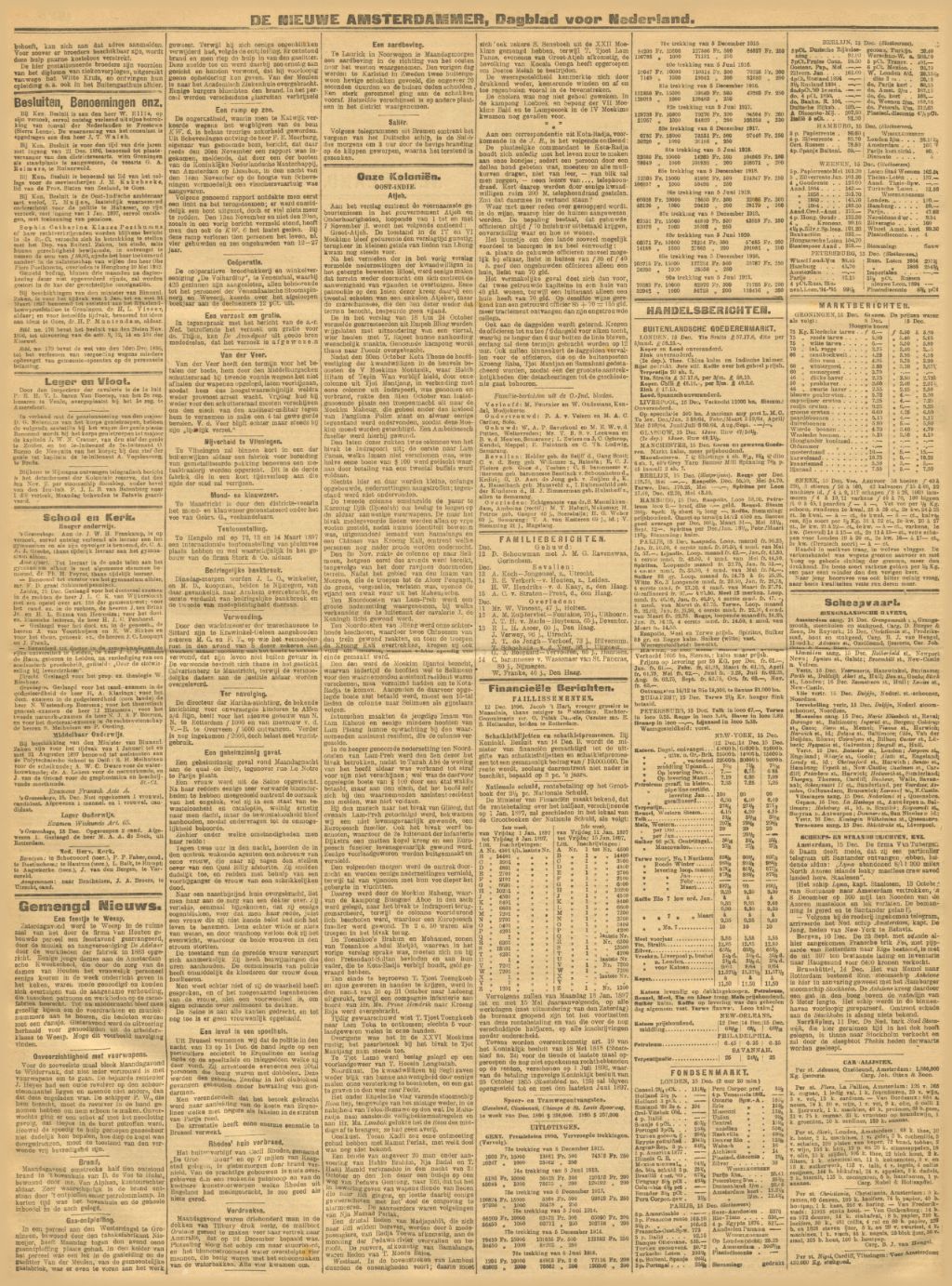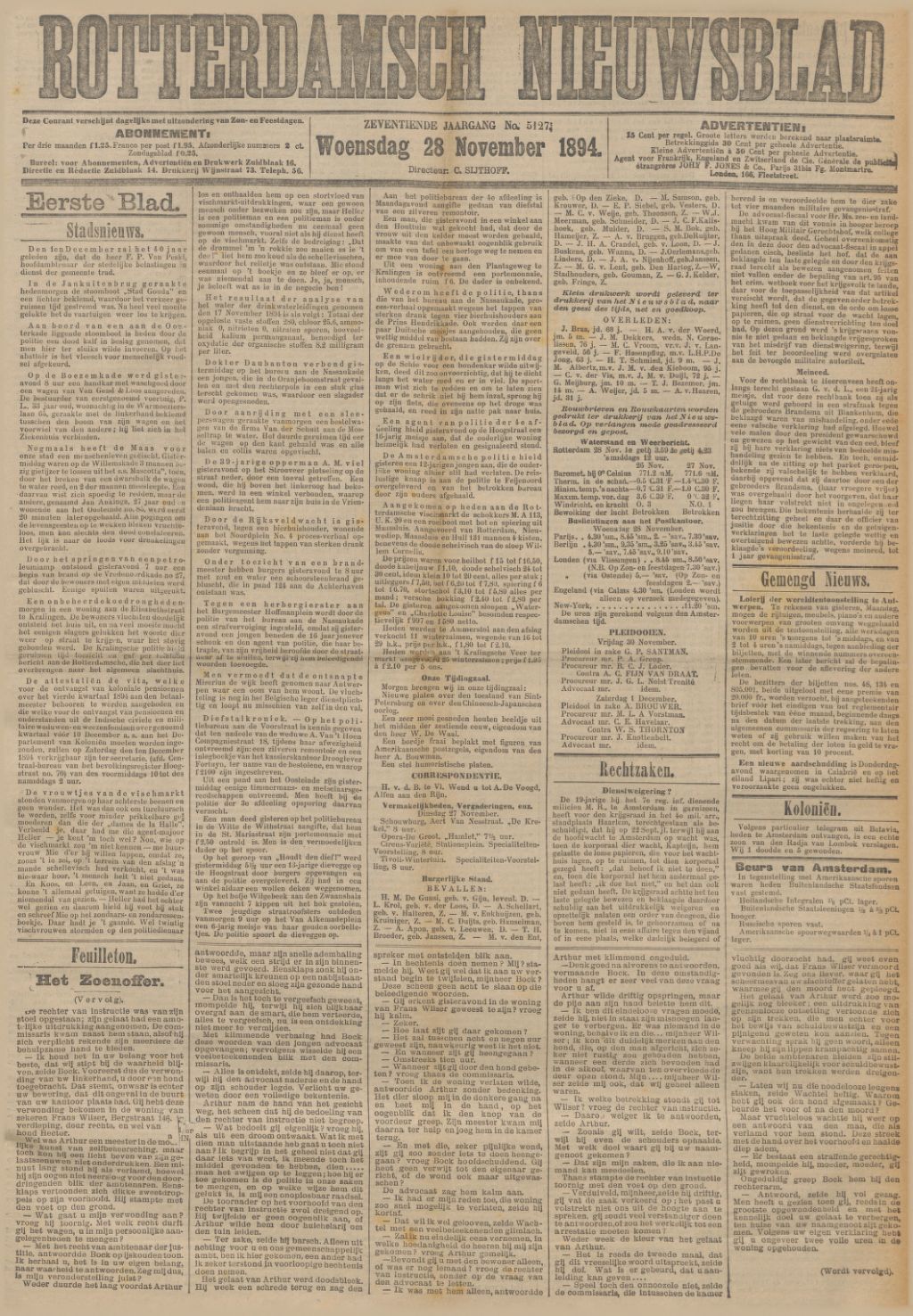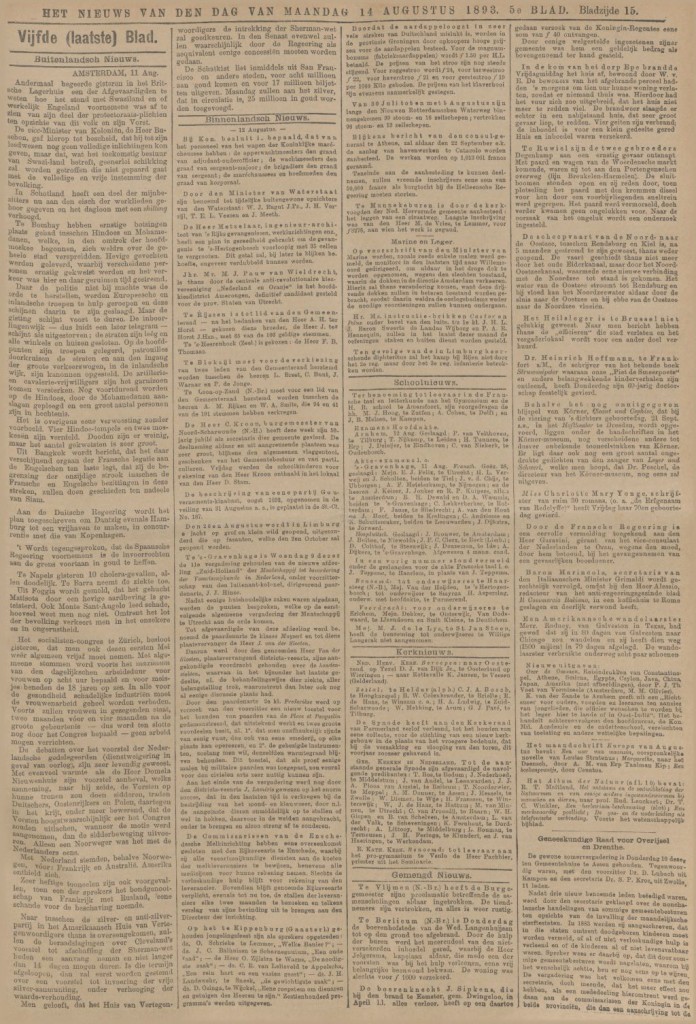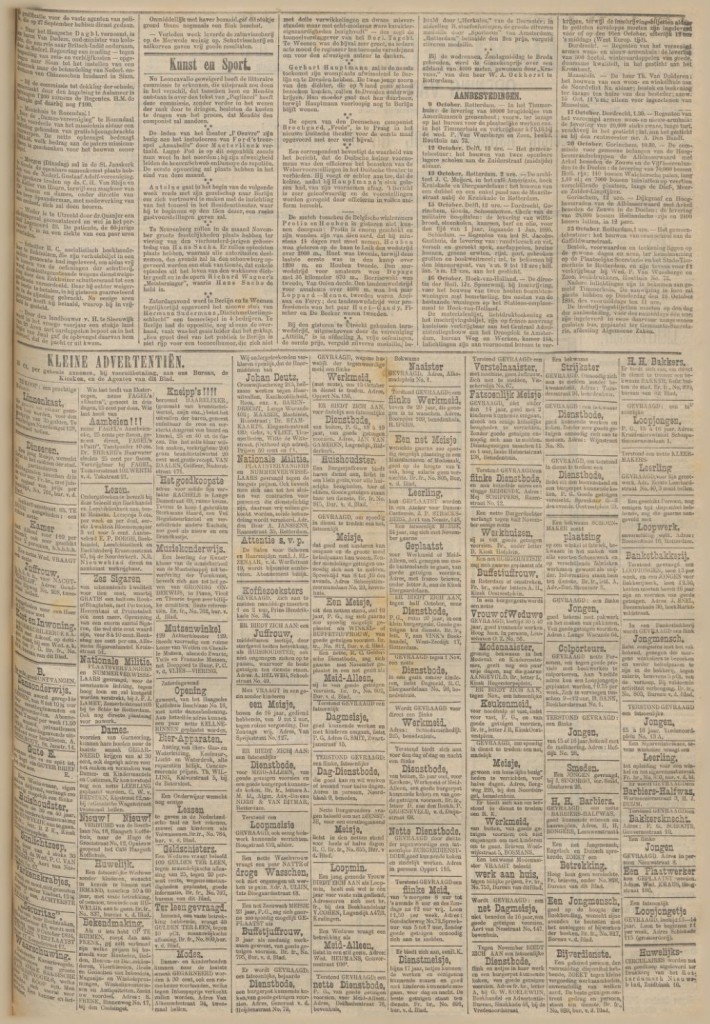The European Library aggregated 108 titles and 188.810 issues of historical newspapers from the Koninklijke Bibliotheek-National Library of the Netherlands (KB). We asked Huibert Crijns, History Specialist from the KB to highlight one newspaper article that is now available at the historic newspaper browser developed by The European Library: Huibert chose an article about the first Conscientious Objector in the Netherlands.

Johan van der Veer is, in the existing literature on the subject, generally and uncontested considered the first conscientious objector to military service in the Netherlands. A short investigation in the digitised newspapers of the National Library of the Netherlands in the Europeana Newspapers browser, deprives him however from this honourable position. Van der Veer was an agitator for the Social-Democrat League in the Netherlands and he closely cooperated with Ferdinand Domela Nieuwenhuis, a well-known anarchist reverend at the time. In 1889 Van der Veer was summoned for military service. While serving he had several encounters with martial law for the distribution of socialist pamphlets among soldiers and for performing as a speaker in military uniform on socialist meetings.[1] In 1896 he was summoned for local militia duty in his hometown Vlissingen. He refused to serve and was sentenced to several fines. As he refused to pay, he was put in prison. The case of Johan van der Veer is well documented. He was a well-known propagandist in socialist circles, and had access to the socialist press, that published extensively on his refusal to fulfil military service. In the newspapers of this period his case was frequently reported on[2].
Refusal of military service

Since Napoleonic times until the 1990s, the Netherlands had several consecutive systems of conscription in which at least part of the male population was obliged to serve in the army and in paramilitary local militias. In Dutch law, the refusal of military service is defined as the refusal or the conscious neglect to obey an order. Of course there are numerous incidents in which persons are sentenced for the refusal to obey orders, not only in the army, but also in the railway service, the postal service or among the crew of ships. Very often the origin of this refusal is a conflict between superiors and subordinates about task and duties or about perceived misuse of power. A good example is reported on in an article in the Rotterdams Nieuwsblad in 1894 on the militiaman M.R, aged 19, serving in the 7th regiment of infantry in Amsterdam: R. appeared before the court-martial in Haarlem, being charged with, while he was performing guard duty at the main guard building, replying to the corporal, who ordered him to clean up papers littering in front of the guard house, ‘I am not supposed to do that’, and when the corporal gave him the order a second time answering ‘I am not going to do that’ and refusing to do so. The court martial considered the accusation proven and convicted the accused for the deliberate refusal to obey an order of a lawful superior, and sentenced him to four months military imprisonment.[3]
Domela Nieuwenhuis

The refusal of Johan van der Veer in 1896 to fulfill his military service in the local militia is however of a totally different character. It is based on political motives and moral principles. He was a conscientious objector. His action didn’t come out of the blue. The concept of objecting military service on ideological grounds is, in the last decade of the 19th century, a new and disturbing phenomenon for the authorities. Not at least because it is propagated by socialist groups as a means to undermine the existing order. In the Netherlands, the anarchist reverend Ferdinand Domela Nieuwenhuis is one of the most influential propagators of objecting military service. In the 1890s he flawlessly travels the country to speak at meetings and gatherings on this topic. He publishes articles and pamphlets and in 1992 is one of the founders of the Social-Democrat Military League, whose aim it is to spread socialist ideas among soldiers and sailors.[4] Domela Nieuwenhuis however does not propagate individual conscientious objection, on the contrary, he considers this quite useless. What Domela Nieuwenhuis envisages is a collective general strike of the international labour movement in times of war. As a result armies could not be mobilized and arms production would come to a standstill. At international socialist meetings proposals of this nature are submitted year after year by successive Dutch delegations, but are time after time rejected as being too utopian. On the socialist congress in Zurich in 1893 only the Dutch, the Norwegian, the French and the Australian delegation are in favour of the Dutch proposal. [5] The outbreak of the First World War in August 1914 means the end of this concept of collective refusal of military service.
Tolstoy
It is clear to us now that the individual conscientious objection of Van der Veer did not have the approval of the socialist movement. Individual objection would make it easy for the authorities to neutralize the objectors one by one. After a heated debate in the socialist newspaper Recht voor Allen (Rights for All), Van der Veer is suspended from the Social-Democratic League. In 1898 he moves to England. Van der Veer’s conscientious objection was, as a matter of fact, not so much influenced by the socialist ideas of Domela Nieuwenhuis, but by another ideology: Tolstoyanism. During the 1890s, Van der Veer became inspired by the Russian author Leo Tolstoy. Tolstoy propagated a form of Christian inspired anarchism, strongly based on Christ’s Sermon on the Mount. In this sermon, radical Christian values are preached, such as love your enemies and turn the other cheek.
The first conscientious objector
The conscientious objection of Johan van der Veer in 1896 causes a scandal in the Netherlands. Van der Veer personally accounts for his deed in public gatherings. The polemic debate in Recht voor Allen is closely monitored by the authorities, the security services and the national press, who all consider Van der Veer a liability for the established order. There is also international attention for his case, not the least because the already famous Leo Tolstoy sends Van der Veer a supportive letter which is published in the papers. For this reason, Van der Veer’s conscientious objection is very well documented, both by the press, in socialist publications and archives, and in martial court files. His case is mentioned in various historical studies on the socialist movement, on conscientious objection, and on pacifism and Tolstoyanism. He is generally considered the first conscientious objector of the Netherlands.
But was he?
A search in digitised Dutch newspapers, also aggregated to the Europeana Newspapers browser, brings to light many cases of refusal to obey orders and of deliberate neglect of duty. But like the incident described above of the militiaman refusing to clean up litter, none of them appears to be based on ideological principles or moral values.

Apart from one: On October 9 1894, the Rotterdams Nieuwsblad reports the following: ‘Militiaman R.C., socialist bookseller in Enkhuizen, who sent a form to the local authorities that he moved to another town in order to evade the exercises of the local militia, was fined on charge of refusal of military service by the militia council of Enkhuizen. As he refused to pay the fine, he was arrested yesterday and taken ransom. After several hours of deliberating, he paid and was released from prison.’ [6] This small and inconspicuous article demands further investigation. Is it possible that this attempt to evade military service has a socialist and thus ideological motivation? Other newspapers do not refer to the case, and it is not mentioned either in any secondary literature. This demands some good old-fashioned sniffing through the archives. The archive of the local militia (Dienstdoende Schutterij) of the city of Enkhuizen, which can be found in the West-Frisian Archives in Hoorn, the Netherlands, provides the answer. On July 13 1893, the mayor of Enkhuizen writes an agitated letter to the commanding officer of the militia: ‘ Militiaman Klaas Clay has publicly displayed in his shop window a militia uniform, to which is attached a sheet of paper stating “Free exhibition of the costume of a murderer without shoes, provided for free”. To the rifle is attached a copy of the newspaper Recht voor Allen.’ [7] This letter makes unequivocally clear that the action of Klaas Claij was intentionally, ideologically motivated and inspired by socialism. As a result, Klaas Claij is in 1893, three years before Johan van der Veer, the first known conscientious objector in the Netherlands. A fact that could only be discovered as a result of the digitisation of newspapers.
Klaas Claij
But who was this Klaas Claij? Till now nothing was known about him. And he doesn’t seem to have published anything himself. An extensive search in many archives mainly produced genealogical information. He was born in 1865 as the sixth child of poor farmers[8]. He became an orphan aged 8[9]. At 21 he travels for a few years to Potsdam and Paris and in 1891 he returns to the Netherlands[10]. In 1893 he is a socialist bookseller in Enkhuizen and refuses to fulfil his military service. For several years he plays hide and seek with the authorities, by moving from place to place, until he moves to London in 1899. At the time, London does not only have a large socialist community, but also a considerable Tolstoyanist movement, of which, not accidentally, Johan van der Veer is an active member. Possibly they knew each other.
Historic newspapers aggregated by Europeana Newspapers can be browsed on both the Europeana and The European Library websites.
[1] VEER, Johannes Koenraad van der, Biografisch Woordenboek van het Socialisme en de Arbeidersbeweging in Nederland, http://www.iisg.nl/bwsa/bios/veer.html
[2] De Amsterdammer, 17 december 1896, p.6: http://www.theeuropeanlibrary.org/tel4/newspapers/issue/3000112955692?page=6
[3] Rotterdams Nieuwsblad, 28 november 1894, Dageditie, blz.1: http://www.theeuropeanlibrary.org/tel4/newspapers/issue/3000100660321
[5] Het nieuws van den dag: Kleine courant, 14 augustus 1893, 5e blad, p.15 http://www.theeuropeanlibrary.org/tel4/newspapers/issue/3000100632966/?page=15
En: F. Domela Nieuwenhuis, Van Christen tot Anarchist. Gedenkschriften van F. Domela Nieuwenhuis, Albert de Jong (red.), (Bussum, 1982)
[6] Rotterdams Nieuwsblad 9 oktober 1894, tweede blad, p. 7: http://www.theeuropeanlibrary.org/tel4/newspapers/issue/3000100660271?page=7
[7] Westfries Archief, Dienstdoende Schutterij Enkhuizen, 0134,67
[8] Westfries Archief, Bevolkingsregister Enkhuizen 1890-1900, C51
[9] Westfries Archief, Bevolkingsregister Schellinkhout 1861-1880, 97-15
[10] Bevolkingsregister Den Haag 1880-1895, Dl 19, blz.101

Hi,
I am looking to purchase original issue of below mentioned newspapers, can you please advise as where can I get these –
> Dutch newspaper – Oprechte Haerlemsche Saterdaegse Courant, 27 June 1671
> French newspaper – LA Gazette, 19 October 1680
> English newspaper – London Gazette, 20 February 1672
Thanks
I request for Adriana Condrau wife of Hubert Van Loon, murderd on 1893